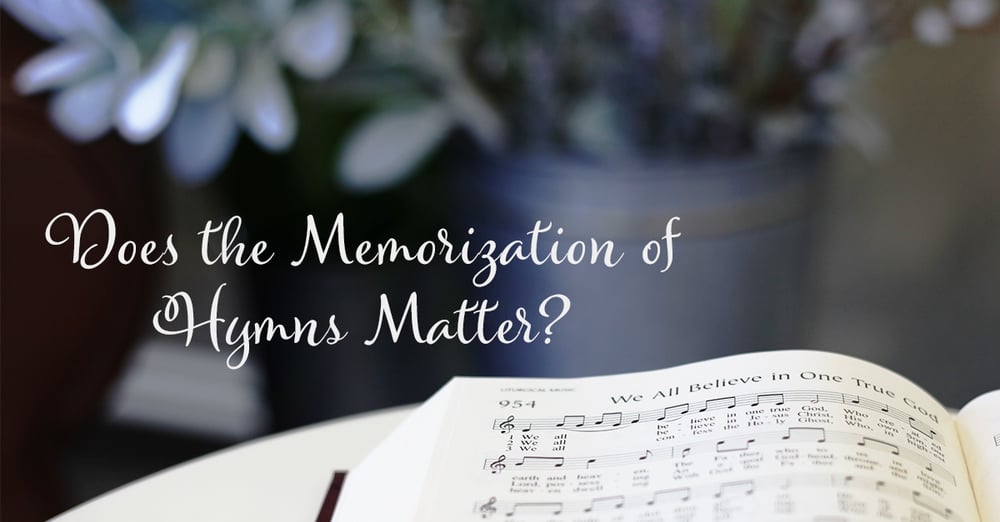We often use music as a tool to memorize things, whether they’re presidents, books of the Bible, states, parts of grammar, the Small Catechism, or any number of other items. The rhythm of songs and the catchiness of melodies make music a convenient vehicle to relay and hold onto facts, stories, lists, and so on. Music in this way serves a great purpose.
But have you ever stopped to wonder why we memorize things? Sure, instantly recalling a fact or name is good and useful and usually speeds up the work that needs to be done. But is there a greater purpose to memorization? Does music’s ability to make memorization quick and easy contain a higher good than simply recollection of fact?
Not Only Information
Music certainly helps us to learn and retain facts and lists, but it also helps us to learn stories and poetry. In the Lutheran Church especially, we love our hymns. Imagine for a moment that you had never sung hymns but only recited them. Certainly, you would still have many memorized just like we typically recite the Lord’s Prayer and the Creed from memory. But would you have as many hymns at instant recall were it not for the music that accompanies them?
And how many times have you heard only the opening strain of a melody or an enthusiastic whistler coming from church and right away recall the words that go with that tune? So we see that music not only helps us memorize the text of hymns and the words of stories but it also reminds us of the content of those hymns and stories by way of a simple melody. And the remembrance of those hymns and stories leads us to contemplate their subject, in this case the object of our worship and devotion—Christ.
Not in Our Own Words
But, you might argue, I can always remember Christ. I simply have to think about Him! Why would it be important for me to remember the exact words to a hymn, words somebody else has written? Sure, singing hymns in church is fine, but when a moment presents itself I would rather come up with my own words to use on the spot. Surely that’s much more personal and from the heart. I don’t need to memorize all these texts. The language isn’t something I would use. Why is memorization so important?
Well, perhaps you are a premier toastmaster, but I know personally that the texts of hymns are always much superior to what I might come up with on the spot. And there may be times when I find myself speechless, unable to think of anything adequate to say. And sometimes (okay, all of the time) the richness of God’s love and the profound wonder of His salvation through Christ freely offered to us is something so incredible that I cannot hope to offer a hymn of praise beautiful enough to even scratch the surface of my gratitude. Indeed, sometimes the common parlance of modern America cannot quite convey what I mean. And in that moment, I know I can turn to indescribably beautiful ancient Latin texts and chants or thunderous and exhilarating Reformation-era hymnody to express what I cannot on my own.
Music: Not Merely a Tool
So we see that memorization is important in its offering of instantly recalling rich and appropriate expressions of thoughts and emotions. Music, then, aids us immensely in memorization. In fact, this article gives several great reasons why music is such a useful tool in this way. When we put the Word of God to music or sing about the story of salvation, we recognize that the words are important; the message proclaimed through the text is vibrant and life-giving, and music is an aid to proclaiming that message and retaining it.
But as church musicians, I think we can claim that music has a higher purpose than merely being used as a tool or an aid. In fact, music itself is a reflection of the beauty and majesty of God. When we sing a hymn we do not merely think, “Oh wonderful, this music is helping us to learn these words we need to know more easily.” No, in fact the music is a very manifestation of what the text of the hymn is saying. For example, the soothing, flowing melody of “The King of Love My Shepherd Is” (LSB 709) places us at the scene of “streams of living water” and “verdant pastures” (st. 2). This melody presents the picture of Jesus as the Good Shepherd who loves and cares for us, His sheep, and gives us rest and plenty. In contrast to this serene scene, the music of the Easter hymn “Christ Jesus Lay in Death’s Strong Bands” (LSB 458) gives an aural representation of the mighty and terrible battle of Christ against Satan and his demons. At the same time, it also presents the solemn yet joyful and exuberant victory of Christ that leads us to “feast this Easter Day” (st. 7) in all happiness and confidence. The music is part of what leads us to understand the reality and importance of Christ’s work and character!
So let us always realize the importance of words proclaiming the Gospel and have those very words ready to recall and use. But let us also see the music that surrounds those words not merely as a tool, but as a very picture of the text as well as a taste and reflection of the glory of God that we will see in all its fullness when we go to be with Him in heaven.
Quotations marked LSB are from Lutheran Service Book, copyright © 2006 Concordia Publishing House. All rights reserved.
Download six free devotions based on Martin Luther’s catechetical hymns.
Martin Luther used many formats to teach the fundamentals of the Christian faith, including music. These devotions cover Luther’s catechetical hymns and will help you meditate on the Gospel.












